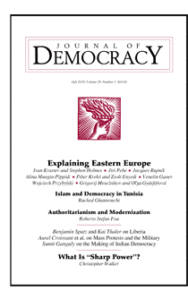 After the fall of the Berlin Wall, in 1989, philanthropist George Soros [inspired by Karl Popper’s Open Society] poured hundreds of millions of dollars into the former Soviet-bloc countries to promote civil society and liberal democracy. It was a one-man Marshall Plan for Eastern Europe, a private initiative without historical precedent. It was also a gamble that a part of the world that had mostly known tyranny would embrace ideas like government accountability and ethnic tolerance, according to Michael Steinberger.
After the fall of the Berlin Wall, in 1989, philanthropist George Soros [inspired by Karl Popper’s Open Society] poured hundreds of millions of dollars into the former Soviet-bloc countries to promote civil society and liberal democracy. It was a one-man Marshall Plan for Eastern Europe, a private initiative without historical precedent. It was also a gamble that a part of the world that had mostly known tyranny would embrace ideas like government accountability and ethnic tolerance, according to Michael Steinberger.
It is an embattled cause these days as Soros’s vision of liberal democracy is under threat in its longtime strongholds, he writes for the New York Times:
Nationalism and tribalism are resurgent, barriers are being raised and borders reinforced and Soros is confronting the possibility that the goal to which he has devoted most of his wealth and the last chapter of his life will end in failure. Not only that: He also finds himself in the unsettling position of being the designated villain of this anti-globalization backlash, his Judaism and career in finance rendering him a made-to-order phantasm for reactionaries worldwide.
 The July 2018 edition of the National Endowment for Democracy’s Journal of Democracy features an eight-article cluster on rising illiberalism in Central and Eastern Europe, an essay on authoritarian sharp power, and more. The NED’s International Forum asks five leading experts: What is the Root Cause of Rising Illiberalism in Central and Eastern Europe?
The July 2018 edition of the National Endowment for Democracy’s Journal of Democracy features an eight-article cluster on rising illiberalism in Central and Eastern Europe, an essay on authoritarian sharp power, and more. The NED’s International Forum asks five leading experts: What is the Root Cause of Rising Illiberalism in Central and Eastern Europe?
Thomas Carothers, a senior vice president at the Carnegie Endowment for International Peace, believes that Soros was a useful cudgel for [Hungary’s illiberal leader Viktor] Orban, Steinberger adds:
Civic groups were the last source of potential opposition, he says, and because some of them were backed by the O.S.F., going after Soros was a way to undermine their credibility. “Strongman leaders want to de-universalize human rights and civic liberties,” says Carothers, who has served on various O.S.F. advisory boards. “It is much harder for Orban to say that he rejects the Universal Declaration of Human Rights. It is much easier to say, ‘I push back against this intrusive man sitting in New York.’ Soros is a very convenient bogeyman.”







